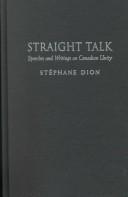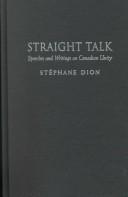| Listing 1 - 2 of 2 |
Sort by
|

ISBN: 1282858114 9786612858116 0773567887 9780773567887 0773518568 9780773518568 0773518533 9780773518537 0773520392 9780773520394 9781282858114 6612858117 Year: 1999 Publisher: Montreal, Que. McGill-Queen's University Press
Abstract | Keywords | Export | Availability | Bookmark
 Loading...
Loading...Choose an application
- Reference Manager
- EndNote
- RefWorks (Direct export to RefWorks)
So begins this collection of Stéphane Dion's speeches from 1996 to 1998. Organized around four central themes, Straight Talk shows the breadth and strength of Dion's convictions. Dion believes that Canada is first and foremost a nation of caring people, in contrast to the image projected by the endless, dry constitutional debate. He argues that the melding of diversity and unity that is the basis of this nation is possible only because of the particular federalism that Canadians have invented. This federalism, however, is far from perfect and it is the responsibility of government to continue to work to improve it, always remembering that its core must be the quality of service it provides to Canadians. Dion believes that the Quebec question is not a constitutional question but one that concerns identity: many francophones believe that their identity and culture are not respected in the rest of Canada and see the anglophone majority as a force for assimilation, while many in other provinces feel that separatists do not share the same values of openness and tolerance. He believes strongly that the secession process the Parti Québecois has proposed - effecting independence on the basis of incorrect legal theory, an unclear referendum question, and a majority of fifty percent plus one - is difficult to reconcile with democracy and raises questions that must be discussed openly and resolved democratically. Straight Talk is a refreshingly honest and frank discussion about a matter that has been at the forefront of Canadian's thoughts for too many years.
Federal government --- Secession --- Federal-provincial relations --- Dominion-provincial relations --- Federal-provincial controversies --- Federal-provincial disputes --- Provincial-federal relations --- Federal-provincial relations (Canada) --- Constitutional law --- Provincial governments --- Sovereignty --- Separatist movements --- Canada --- Québec (Province) --- English-French relations. --- Politics and government --- History --- Autonomy and independence movements. --- French-English relations --- Quebec (Province)

ISBN: 128285853X 9786612858536 0773568344 9780773568341 0773520392 9780773520394 0773520384 9780773520387 Year: 1999 Publisher: Montréal [Que.] McGill-Queen's University Press
Abstract | Keywords | Export | Availability | Bookmark
 Loading...
Loading...Choose an application
- Reference Manager
- EndNote
- RefWorks (Direct export to RefWorks)
Le Canada n'avait pas connu de politicien de la trempe de Stéphane Dion depuis Pierre Trudeau. Ses réponses cinglantes aux déclarations du Premier ministre Lucien Bouchard sur la séparation ont rendu les souverainistes furieux. Et ses discours ont étonné les commentateurs, toutes tendances politiques confondues. Pour la première fois depuis longtemps, un politicien a eu l'audace de prendre à partie l'opposition. Comme Trudeau, Dion est un brillant universitaire, recruté par le Parti libéral du Canada en raison de ses profondes convictions et de son désir d'imprimer un nouveau dynamisme au fédéralisme canadien. Nommé ministre des Affaires intergouvernementales et élu au Parlement, il s'est retrouvé au coeur même des débats portant sur les grands enjeux en matière des relations fédérales-provinciales. Mais ce sont ses incursions au Québec qui ont attiré l'attention des médias. Ses lettres au Premier ministre Bouchard et au vice-premier ministre Bernard Landry ont défini pour la première fois le coût de la séparation. Il a irrité les séparatistes en déclarant que si le Canada était divisible, le Québec l'était aussi. Il a aussi irrité les anglophones en présentant la Loi 101, la loi du Québec qui porte sur la langue, comme une grande loi canadienne. Stéphane Dion parle avec clarté et passion de la complexité, de la beauté et des contradictions du Canada. Le pari de la franchise définit sa pensée en matière de réconciliation nationale.
Federal government --- Canada --- Québec (Province) --- Politics and government --- History --- Autonomy and independence movements. --- Fédéralisme --- Relations fédérales-provinciales (Canada) --- Quebec (Province)
| Listing 1 - 2 of 2 |
Sort by
|

 Search
Search Feedback
Feedback About UniCat
About UniCat  Help
Help News
News